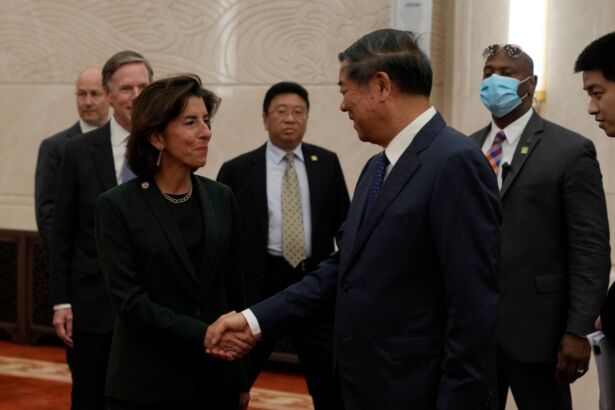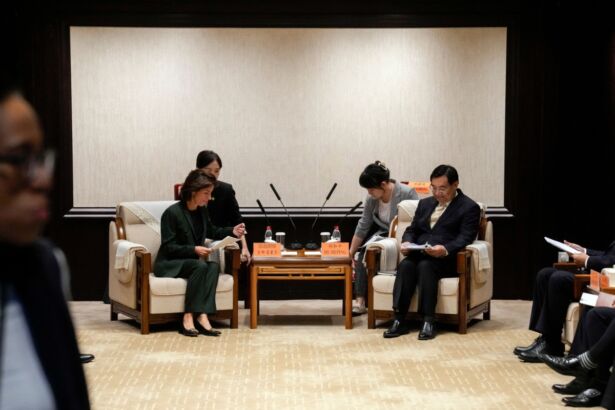The United States will not compromise on national security, but it doesn’t seek to decouple from Beijing, U.S. Commerce Secretary Gina Raimondo told senior Chinese officials on Tuesday.
Ms. Raimondo is on the second day of talks in China as part of the Biden administration’s efforts to reopen communication lines with the communist regime. The bilateral ties between Beijing and Washington have deteriorated this year over a slew of issues, from trade, tariffs, and Taiwan to alleged spies. The most recent episodes include the breach of U.S. government emails by China-linked hackers.
Ms. Raimondo, the fourth senior American official to travel to China in 10 weeks, met several high-ranking Chinese officials on Tuesday before talking to Premier Li Qiang.
“I have had a very productive visit so far,” Ms. Raimondo told Mr. Li ahead of the closed-door sessions. “President Biden asked me to come here to convey a message that we do not seek to decouple; we seek to maintain our $700 billion commercial relationship with China.”
Mr. Li highlighted that economic and trade relations are crucial for the stability of the U.S.-China ties. But he hopes Washington “can work in the same direction with China” and develop the bilateral ties with “more sincerity and concrete actions.”
Earlier on Tuesday, Ms. Raimondo also sat down with Vice Premier He Lifeng, Chinese leader Xi Jinping’s close ally who oversees the country’s economy.
“While we will never compromise in protecting our national security, I want to be clear that we will never seek to decouple or hold China’s economy back,” Ms. Raimondo said at the start of the meeting.
Mr. He raised concerns about the U.S. tariffs, export controls, and investment restrictions, according to the readout from China’s Ministry of Commerce.

Export Control Dialogues
Separately, senior officials from Beijing and Washington are scheduled to have the first “information exchange” on export control on Tuesday.
The platform was set up during the in-person meeting between Ms. Raimondo and her Chinese counterpart, Wang Wentao, which lasted more than four hours on Monday.
The two commerce chiefs also agreed to have regular conversations and meet “at least once a year,” according to China’s commerce ministry. The ministry described their first exchange as “rational, frank, and constructive.”
Another agreement reached during the exchange was to set up a new “commercial issues” working group to “seek solutions on trade and investment issues and to advance U.S. commercial interests in China,” the U.S. Commerce Department said.
U.S. President Joe Biden signed an executive order earlier this month to restrict investment in China’s sensitive technologies, including quantum computing, artificial intelligence, and semiconductors sectors. The order, which is likely to take effect next year, will prohibit American private equity and venture capital from flowing into China, funding the regime to advance its military and intelligence capabilities. The move followed a sweeping semiconductors export controls to China, unveiled by President Biden last October.
The Chinese regime has already tightened its own export controls. Starting from Aug. 1, gallium and germanium—two rare metals critical to the manufacturing of semiconductors—are subject to export restrictions, the Ministry of Commerce announced in July, citing the need to protect national security.
China holds a dominant position in mining the two rare minerals. It supplied around 80 percent of the world’s production of gallium and 60 percent of germanium, according to Critical Raw Materials Alliance.
Beijing also slapped sanctions on U.S. chipmaker Micron Technology. China’s cybersecurity regulator in May said Micron failed its security review without elaborating what risks it had found. That move means Micron’s products would be banned from Chinese companies operating critical infrastructure projects. The company warned that a “low-double-digit percentage” of its global revenue is “at risk of being impacted” by Beijing’s sanction.
Ms. Raimondo said on Monday that she raised concerns about Beijing’s restrictions on Micron Technology, Intel, and other U.S. business during the meeting with Mr. Wang.

On Tuesday morning, Ms. Raimondo met with Chinese Minister of Culture and Tourism Hu Heping, during which she “underscored the importance of people-to-people exchange to the broader U.S.-China bilateral relationship,” according to her department.
China recently lifted the pandemic-era ban on group tourism to the United States, the United Kingdom, Australia, and other nations, seven months after it resumed group tours to countries like Russia, Thailand, and Cuba. The United States announced earlier this month that it would increase flights to China.
Ms. Raimondo said the relaxation would “create jobs and grow the economies of both countries and foster better understanding between the people and cultures of the two nations.”
‘Not the Time to Make Concessions’
Ahead of Tuesday’s talks, outside observers expected the Chinese officials to break from Beijing’s aggressive diplomatic posture as China seeks to attract foreign investment in the face of deflection risks.
“The Americans have been reaching out to China for two and a half years and have been rebuffed; communist China’s treating the Biden administration like a lackey,” Bart Marcois, former principal deputy assistant secretary of International Affairs at the Energy Department, told NTD, the sister media outlet of The Epoch Times.
Now, “they are facing their real estate empire imploding and an economic depression, they suddenly have an interest in speaking to America, and of course, it’s on commerce and trade.”
China’s economy is faltering. One in five young Chinese, between the ages of 16 and 24, are jobless. The real estate sector, which contributed to nearly one-third of China’s GDP, is in trouble. Real estate giant Evergrande filed for bankruptcy protection earlier this month, and Country Garden, another large property developer, is now in danger of default. Foreign investors are pulling money out of Chinese stocks.
Earlier this month, U.S. Treasury Secretary Janet Yellen said China’s economic slowdown is a “risk factor” for the United States, and President Biden described China’s economy as a “ticking time bomb” at a political fundraiser.
Mr. Marcois predicted that the Chinese regime would “make a lot of overtures and act like they are making concessions” to the United States in the face of an ailing economy.
“But what they really want is to be able to continue investing in strategic real estate and strategic technology” in the United States without interfering and want “increased American investment in China,” he added.
Mr. Marcois said Ms. Raimondo’s China trip has more importance to Beijing than Washington.
“It’s not as important to us because we hold the upper hand here,” he said. “If she can just hold firm, then we could make progress.” But if Ms. Raimondo focuses on diplomatic detente, “we’re playing the Chinese game rather than the American game.”
“Now is not the time to make concessions. Now’s the time to ask China to make concessions,” he said.
“They need our help. And we need to make sure that we get something important in return.”
From The Epoch Times
